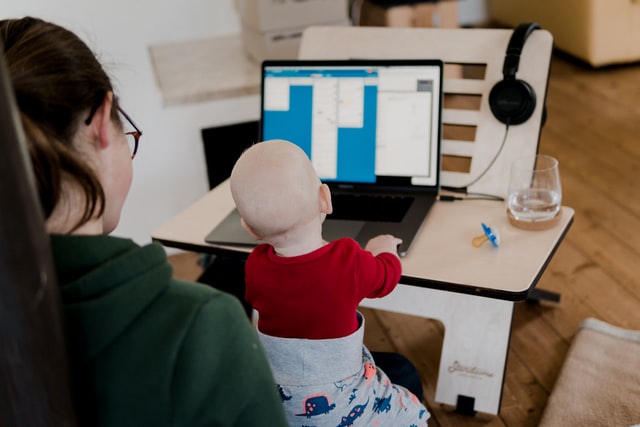It’s not uncommon for a parent to feel stressed over caring for their children. Especially with a firstborn, frustration can build up when an infant can’t speak words to communicate properly. Once the child becomes self-aware, there’s also the rebellious phase that comes with being a teen. As much as there is joy, there are many challenges that come with being a parent, and knowing how to cope with these stressful phases becomes vital.
In this post, we will explain few ways to reprogram your way of thinking so that there’s less stress felt throughout your parenting journey. There are 2 categories for the 2 phases a child goes through that we will explain.
The Infant Phase

One of the top moments a parent feels stressed is when we don’t understand what their infant is trying to communicate. This is a phase where we also have to deal with our own insecurities and frustrations of not being a pro parent yet.
・Embrace a Child’s Need to Learn From Their Failures

Typically, once an infant can walk, they start making a mess. Sometimes they won’t even listen to what you have to say, and that can be quite frustrating. Oftentimes we try to discipline them right away, but it’s important that we give the child an opportunity to fail and learn on their own.
For example, if your child insists on only wearing a t-shirt in the freezing cold outside, a natural response is to try and teach them to wear a sweater “because they’ll catch a cold.” However, a child that doesn’t understand this will reject the idea. This kind of small rejection leads to frustration for many parents.
When you want to discipline a child, it’s important that they understand the consequences. Instead of telling them what is wrong or right, embrace a child’s failure so that they can learn. In this case, let the child step outside in a t-shirt once so they themselves understand that more layers are needed.
・It’s Okay if You’re Not the “Perfect Parent”

Parents are role models for the children, but that doesn’t mean we all become perfect people once we’re parents. Regardless, we all try to strive for perfection so that we can meet our ideals of what a parent should be. This can cause stress and frustration. It’s important to let go of perfectionism and be okay with not being the “perfect parent.”
Parental demands can be stressful at times. If you’re feeling stressed, ask for help from a partner or family to take some occasional time off. You are your own person before you’re a parent. You should take good care of your mental wellbeing so that you don’t reach a point of boiling frustration.
Remember that you’re on a growth path together with your children and everyone in the family. That should bring a sense of relief.
・Visualize Near-Future Possibilities

No matter how hard we try, there are still unexpected moments where we feel the mental toll of being a parent. If you feel that your frustration might be pointed unfairly towards your partner or child, try to envision the following things:
- He/she is naughty now, but what are the chances that they grow to become someone incredible?
- What would my child be interested in once she/he enters elementary school?
- Would I be able to share the struggles of being a parent once he/she has their own child?
By visualizing a future, you can get away from the present reality for a while and also use the gained motivation to strive forward.
The Child to Teen Phase

The idea of individuality and independence sprouts between the child to teen phase. The parent needs to adapt to the rapid changes that happen during this phase. Otherwise, there will be lots of repetitive clashes that create frustration on both ends.
・Understand That They Are Different From You

Once a child enters elementary school, they become more and more capable of doing things on their own, and individual personalities start to grow.
If you come off as too overbearing during this phase, it will lead to countless arguments and stress. As your child grows, try to grow your own sense of understandings along with them. A healthy acknowledgment, that your child is a different person from you, will create a good sense of mental relief in keeping a healthy relationship.
・Respect Their Individuality

It’s very important to respect a child’s unique individuality.
For example, if a child wants to do other things than study, you might tell them, “Your future happiness depends on how hard you study.” A child may resent the fact that you took away their passion if you stop them forcefully. The rebellious phase is a tricky phase that can easily escalate to lots of arguments and frustrations.
Each person has their own way to value happiness. Even as a parent, you should be very mindful not to push your own values of what happiness means. If you can show respect to the uniqueness that they hold and try to be their support throughout, parenting will become less frustrating.
・Learn How To Better Manage Anger

Anger management is an important tool to self-control the anger that manifests within. If you feel anger arise, the next few actions can help suppress it quickly and effectively.
- Immediately count to 6 on the spot
- Create physical distance between the cause of your anger
- Recall positive memories from the past
- Take a deep breath
- Cook
These are just a few examples of the actions you can take to steer your focus away from anger.
A university study took 4 pairs of parents and asked them to exercise anger management. Results showed that it gave them a rational perspective on their anger and helped curb frustration.
As a child grows, they will become self-aware and disapprove reactionary anger that comes from a parent. The best attitude and practice to have as a parent is to start from within.
Change Your Outlook To Grow Happier Together

If you tend to feel stressed and overwhelmed from the responsibilities of being a parent, all you need is a little shift in your outlook to reduce some of that stress.
It’s also very important that you learn how to take enjoyable breaks through exercise and hobbies. To learn more about ways to relieve parental stress, check out this other post!
Reference:
Matsumoto, M., & Shibayama, K. (2011). Anger Management for Interpersonal Relationship Improvement. Memoirs of the Faculty of Education, Kumamoto University. The Humanities, 60, 153–162. https://ci.nii.ac.jp/naid/110008750850



